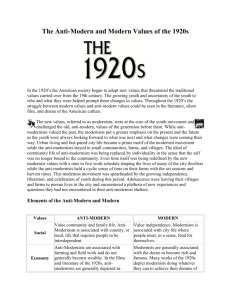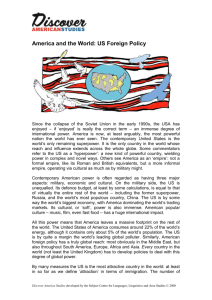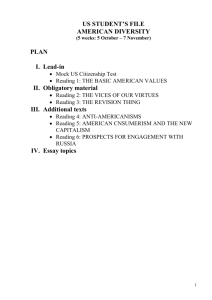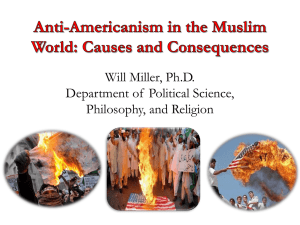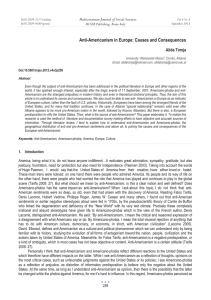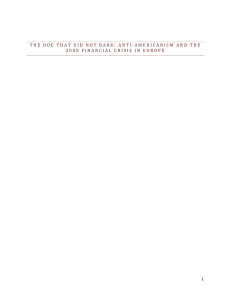Why Do They Hate Us
advertisement
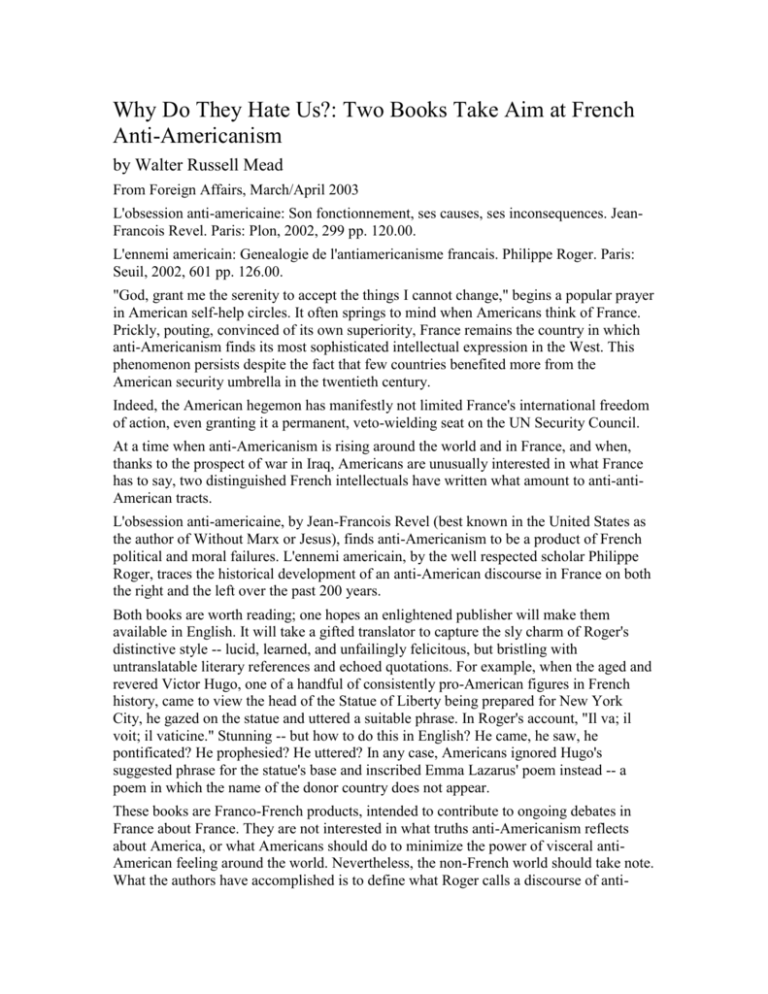
Why Do They Hate Us?: Two Books Take Aim at French Anti-Americanism by Walter Russell Mead From Foreign Affairs, March/April 2003 L'obsession anti-americaine: Son fonctionnement, ses causes, ses inconsequences. JeanFrancois Revel. Paris: Plon, 2002, 299 pp. 120.00. L'ennemi americain: Genealogie de l'antiamericanisme francais. Philippe Roger. Paris: Seuil, 2002, 601 pp. 126.00. "God, grant me the serenity to accept the things I cannot change," begins a popular prayer in American self-help circles. It often springs to mind when Americans think of France. Prickly, pouting, convinced of its own superiority, France remains the country in which anti-Americanism finds its most sophisticated intellectual expression in the West. This phenomenon persists despite the fact that few countries benefited more from the American security umbrella in the twentieth century. Indeed, the American hegemon has manifestly not limited France's international freedom of action, even granting it a permanent, veto-wielding seat on the UN Security Council. At a time when anti-Americanism is rising around the world and in France, and when, thanks to the prospect of war in Iraq, Americans are unusually interested in what France has to say, two distinguished French intellectuals have written what amount to anti-antiAmerican tracts. L'obsession anti-americaine, by Jean-Francois Revel (best known in the United States as the author of Without Marx or Jesus), finds anti-Americanism to be a product of French political and moral failures. L'ennemi americain, by the well respected scholar Philippe Roger, traces the historical development of an anti-American discourse in France on both the right and the left over the past 200 years. Both books are worth reading; one hopes an enlightened publisher will make them available in English. It will take a gifted translator to capture the sly charm of Roger's distinctive style -- lucid, learned, and unfailingly felicitous, but bristling with untranslatable literary references and echoed quotations. For example, when the aged and revered Victor Hugo, one of a handful of consistently pro-American figures in French history, came to view the head of the Statue of Liberty being prepared for New York City, he gazed on the statue and uttered a suitable phrase. In Roger's account, "Il va; il voit; il vaticine." Stunning -- but how to do this in English? He came, he saw, he pontificated? He prophesied? He uttered? In any case, Americans ignored Hugo's suggested phrase for the statue's base and inscribed Emma Lazarus' poem instead -- a poem in which the name of the donor country does not appear. These books are Franco-French products, intended to contribute to ongoing debates in France about France. They are not interested in what truths anti-Americanism reflects about America, or what Americans should do to minimize the power of visceral antiAmerican feeling around the world. Nevertheless, the non-French world should take note. What the authors have accomplished is to define what Roger calls a discourse of anti- Americanism: a free-floating but well defined set of ideas and perceptions that, over time, have crystallized into a coherent world view. Anti-Americanism in this sense is very different from opposition to some specific American policy; it is a systematic view of the United States as a danger to all one holds dear. On the one hand, anti-Americanism is, as both Revel and Roger convincingly argue, a self-referential Franco-French phenomenon largely untroubled by larger questions of fact. On the other hand, the rise and persistence of this discourse reflects actual historical trends. Anti-Americanism developed and persisted in France because the United States thwarted, threatened, and diminished that country. Anti-Gallicism in the United States has had a fitful and shadowy life because France has only rarely risen to more than a nuisance in American eyes. In the realms of power politics, economics, and culture, French anti-Americanism is the psychological footprint of a conflict -- a conflict all the more irksome to the loser simply because the winner never seems to have paid it much attention. As Roger shows, the development of French anti-Americanism faithfully follows the twists and turns of world power since the eighteenth century. The short-lived "Lafayette" period of Franco-American amity during the American Revolution came at a time when France was seeking revenge on Britain for the humiliations of the Seven Years' War. If the French could not have a North American empire, perhaps the British could also be denied. France saw the United States as a transatlantic ally that could help contain the true enemy at the time: perfidious Albion. After its own independence was won, the United States refused to make common cause against Britain during France's revolutionary wars. Worse, when the proclamation of the Monroe Doctrine aligned the United States with the United Kingdom to ban European powers from the Americas, France realized to its horror that, far from balancing the British, independent America would support them. "I have not found a single Englishman who did not feel at home among Americans and not a single Frenchman who did not feel a stranger," sighed Talleyrand. THE PHANTOM MENACE The real shock came in 1898 -- a date, Roger argues, almost as important to the French as it was to the Spanish-speaking world. The French interpreted the American attack on Spain as the beginning of an American war with Europe -- a war that the Old World might lose. The new Anglo-Saxons were more powerful, more ruthless, and more determined than the old. The loathsome Monroe Doctrine would be extended to ban European colonies in Asia and Africa. An Anglo-Saxon condominium, with power ultimately passing to the more frightening and less civilized Americans, would dominate the world. Even the hated Germans might serve as an ally against this horrifying power. That was not all. American power was not only a hostile geopolitical force. Its economic dynamism challenged and threatened French society on many fronts. The unbridled liberalism of the Anglo-Americans offered France unpalatable choices: adapt or fall behind. Identifying the United States as the land of a harsh and brutal "absolute capitalism" was (and is) widely popular on both the right and the left in France. Roger gives great credit to Charles Maurras, founder of the controversial royalist and integralist review L'Action Francaise, whose influential work painted a picture of a society shaped by the impersonal requirements of an uncaring market to the exclusion of all humane concerns. The world is indebted to Maurras for another durable element of anti-Americanism: the link between Americans and Jews and the "menace" they posed to European civilization. The United States, land of rootless immigrants and amoral capital, was to antisemites the perfect territory for what Joseph Stalin would call Europe's "rootless cosmopolitans." Maurras believed early in his career that the Germanophile American Jews in finance influenced Woodrow Wilson's tardiness at entering World War I and his refusal to back France's claims at the Versailles peace conference. By the end of Maurras' career, however, it was the Germanophobic Jews around Roosevelt who worried Maurras and his Vichy friends. Partly because of the hard-nosed U.S. attitude toward French debts from World War I, and partly because of the belief that Jews ran the American financial system, a generation of Frenchmen grew up thinking of Uncle Sam as "Oncle Shylock." Attacks by parties across the French political spectrum on the transatlantic "plutocracy" -and the perceived corrupt domination of its institutions by a handful of (often Jewish) billionaires -- echo down the bloody corridors of the twentieth century to our own day. If there is anything missing in these books, it would be a discussion of the relationship between French Anglophobia and French anti-Americanism. Both in France and beyond, new anti-Americanism is simply old Anglophobia writ large. Anti-Anglo-Saxonism has been a key intellectual and cultural force in European history since the English replaced the Dutch as the leading Protestant, capitalist, liberal, and maritime power in the late seventeenth century. The image of Anglophone "New Carthage" -- cruel, treacherous, barbarous, plutocratic -- that Jacobin and Napoleonic propaganda assiduously disseminated contains the essential features of anti-Anglo-Saxon portraits so familiar today. The humiliations and setbacks that France suffered at American hands in the twentieth century chafe so badly in part because they rub the old wounds that the British inflicted in the eighteenth and nineteenth centuries. The British destroyed the empires of the Bourbons and Bonaparte; the rise of the United States established a new superpower league in world politics in which France can never compete. The dog-eat-dog competition of Anglo-Saxon capitalism forces French firms to adjust, and it steadily undermines France's efforts to maintain its social status quo. The English language has replaced French in science, diplomacy, and letters; the list goes on. Many Americans take comfort in the fact that French writers such as Ravel and Roger are now subjecting anti-American discourse to such a critical drubbing. Surely, they hope, the great dismal fog of Gallic anti-Americanism is lifting. Maybe France will start using the Serenity Prayer and accept a few things that it cannot change. On the evidence of these books, however, anti-Anglo-Saxonism is deeply rooted and widely spread. It is likely to flourish as long as its causes exist. These causes are not, as perennially optimistic Americans want to think, American shortcomings and failures. America's failures and crimes are the patrimony of antiAmericanism, its treasures and its darlings. They inflame and disseminate antiAmericanism, but they are not its root cause. For that we must look to American success, American power, and America's consequent ability to thwart the ambitions of other states and impose its agenda on the rest of the world. France is not the only country in Europe or the world whose ambitions were frustrated by the British and American hegemonies. France is not the only country which, left to its own devices, would embrace a kinder and gentler, if slower, form of capitalist transformation than the one that the Anglo-Saxon model imposes. France is not the only country in which intellectual and social elites dread the restructuring and decentralization that the Anglo-Saxon model brings in its train. Nor is it the only country where the state fears the loss of authority and power to Anglo-Saxon-driven globalization, with its attendant requirements of low taxes, transparency, and equal treatment for foreign investors and firms. The challenge for Americans and non-Americans alike is not to end anti-Americanism; only the collapse of American power could accomplish that task. Today, the task is to manage pragmatically the resentments, irritations, and real grievances that inevitably accompany the rise to power of one nation, one culture, and one social model in a complex, divided, and passionate world.
